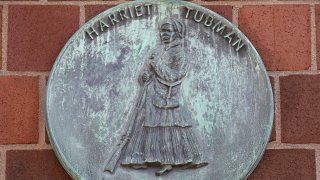
A Boston building named in honor of 19th-century abolitionist Harriet Tubman that for years served as the home to a neighborhood services organization has been demolished to make way for condominiums, leaving some residents feeling powerless and hopeless in the face of relentless gentrification.
United South End Settlements, the nonprofit that owned the property in the city's South End, sold it to a developer that plans to build condominiums, community space and artist live-work units at the site, WBUR reported Friday.
The demolition came despite protests by residents who say the site was a beacon for the neighborhood's Black population. The building was spray painted with graffiti during the summer.
United South End Settlements officials said they need money from the sale to sustain vital community services, including day care and food programs, and the organization is relocating to another site in the neighborhood.
That still didn't sit well with some.
Marisa Luse said the news of the demolition of the Harriet Tubman House "was very sad, traumatizing … There was a rush of emotions from confusion, frustration, disappointment and hopelessness."
Dart Adams, a Boston historian who grew up in the South End and who took part in the protests, said the Tubman house was important in so many ways.
Local
"There were so many different support systems, there was counseling. It was a place for the community," he said. "I feel incredibly sad and powerless. It represents so much of the history of the neighborhood."
The building's demolition is another sign that the neighborhood is becoming inaccessible.
The South End has undergone a complete transformation, said activist and artist Keith Jones, who moved into the neighborhood with his family in the early 1980s. "When we got there … it was culturally diverse, mixed income. We had everybody and everything. Now you can't get in."
Critics of United South End Settlements said the nonprofit failed to do its due diligence when considering other options for the property.
"It's the literal and figurative destruction" of the Black and brown history of Boston, Adams said.



